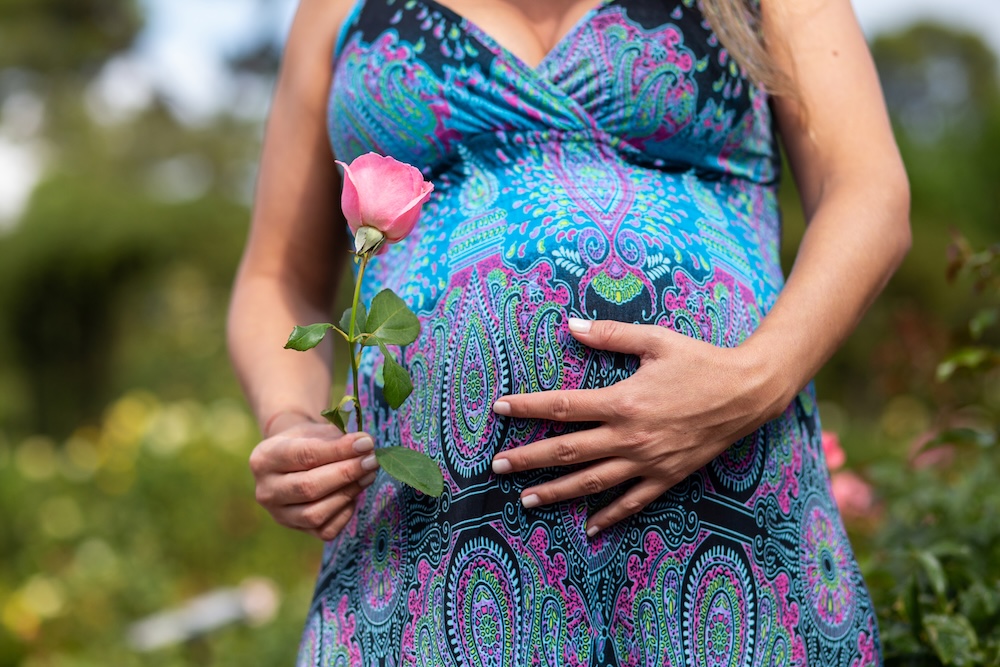Why Sustainability Matters in Pregnancy
Pregnancy is a time of transformation—not just physically, but in how you relate to the world around you. Many expecting parents become more aware of chemical exposure, product choices, and environmental impact, and for good reason.
Choosing sustainable practices during pregnancy supports:
- Lower toxin exposure for both parent and baby
- Healthier indoor air and water quality
- Less waste and pollution
- A stronger connection to conscious consumption habits
Let’s break down the most impactful ways to live sustainably while growing a new life.
1. Clean Up Personal Care Products
Your skin absorbs what you put on it, and some chemicals can cross the placenta.
What to Avoid:
- Phthalates (often hidden in “fragrance”)
- Parabens
- Formaldehyde releasers
- Retinoids/retinol (linked to birth defects)
Safer Alternatives:
- Fragrance-free or essential oil–based lotions
- Mineral sunscreens (zinc oxide, titanium dioxide)
- Natural body care brands with EWG Verified or Made Safe certifications
2. Rethink Household Cleaning
Pregnancy heightens sensitivity to smells and chemicals. Many standard cleaners release VOCs and endocrine disruptors.
Tips for Low-Tox Cleaning:
- Swap bleach for hydrogen peroxide
- Use vinegar and baking soda for all-purpose cleaning
- Skip aerosol sprays—opt for pump bottles or reusable cloths
3. Eat Organic When Possible
Reducing exposure to pesticides, hormones, and antibiotics in food is especially important during fetal development.
Focus on Organic Versions Of:
- Leafy greens and berries (high in pesticides when conventional)
- Dairy and meat (to avoid hormones/antibiotics)
- Whole grains (some are sprayed with glyphosate)
If organic isn’t in your budget, prioritize the Dirty Dozen list and wash produce thoroughly.
4. Choose Safer Cookware and Food Storage
Avoid plastics that can leach chemicals when heated.
Safer Choices:
- Use glass or stainless steel containers
- Choose cast iron, stainless steel, or ceramic-coated cookware
- Never microwave in plastic—even if labeled “microwave safe”
5. Select Sustainable Maternity Clothing
Fast fashion is wasteful and often loaded with synthetic dyes.
Greener Options:
- Borrow or buy secondhand
- Choose natural fibers: organic cotton, hemp, bamboo
- Support ethical brands that offer repair, return, or resale programs
6. Plan an Eco-Friendly Nursery
New baby gear is exciting, but much of it is plastic-heavy and short-lived.
Sustainable Swaps:
- Choose secondhand cribs, strollers, and bassinets that meet safety standards
- Use low-VOC paint in nursery walls
- Look for GOTS-certified organic crib sheets and mattresses
7. Water and Air Quality Count
Your indoor environment can have a bigger impact than outdoor pollutants.
Purify Your Space:
- Use a HEPA air filter if near traffic or wildfire zones
- Install a carbon filter on your tap or use a gravity-fed water system
- Houseplants like peace lilies and spider plants help clean air naturally
8. Mindful Waste and Minimalism
Babies don’t need as much gear as marketers suggest. Excess consumerism = excess waste.
Tips:
- Register for reusable or multi-purpose items
- Use cloth diapers or compostable options
- Choose washable nursing pads, rechargeable batteries, and glass baby bottles
FAQs About Sustainable Pregnancy
Is it safe to use essential oils while pregnant?
Some are, others aren’t. Avoid high-potency oils like clary sage, rosemary, and cinnamon. Always dilute and check with your provider.
Do I need to throw out all my old products?
No—but transition over time. Start with the most frequently used (lotions, soaps, toothpaste).
Are cloth diapers really better?
They significantly reduce landfill waste and cost less over time—especially with multiple children.
What about sustainable prenatal vitamins?
Look for third-party tested, vegan, and plastic-free packaging if possible.
Final Thoughts: Pregnancy Is a Great Time to Start Fresh
Sustainable living during pregnancy isn’t about perfection—it’s about awareness. Every small shift you make contributes to a healthier baby, home, and planet.
The habits you build now will influence your child’s environment and values for years to come. It’s never too early—or too late—to make mindful choices.








